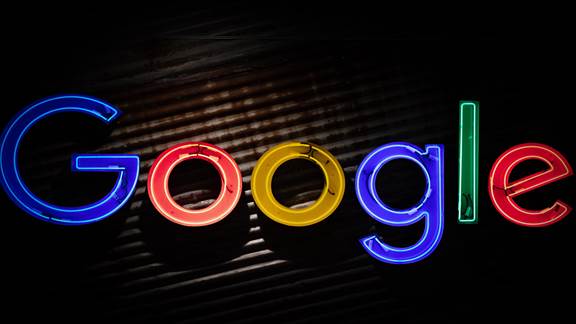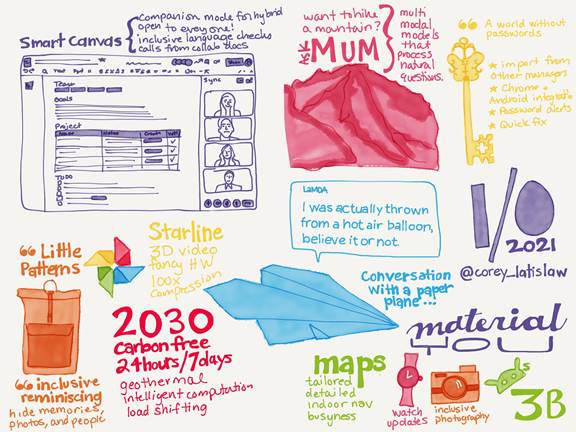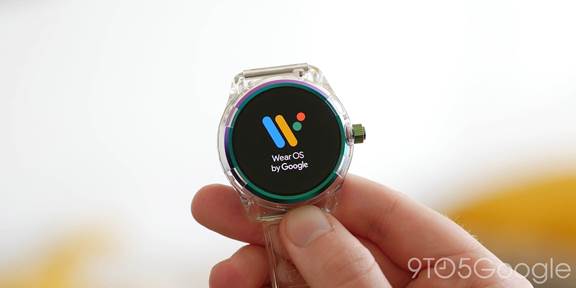Google’s annual developer conference - I/O - returned last night after an unplanned break in 2020 due to the coronavirus crisis.
These days, the big-tech conference keynotes provide an opportunity for these behemoths to set out the stall for the years ahead to the wider world - not just developers. That means a heady mix of big reveals for different audiences: some announcements that are still squarely directed at the core of developers and designers, some are product launches and marketing for the general public, some are targeting investors, and there’s now a distinct political and legal PR tinge in a world where calls for regulation and break-up of these powerful organisations is growing each year.
Google’s continued investment in both new consumer facing products - like Android OS, Search and Google Suite - as well as foundational tech like AI, AR and Quantum Computing meant a set of announcements on a number of time horizons. There are products and platform changes arriving now, some things that are near launch but not quite here yet, and some concepts and advances that’ll impact the next horizon.
We’ve pulled together the most important parts of yesterday’s keynote on each of these horizons below.

Google I/O 2021
Now
Android 12 focuses on privacy and accessibility improvements
The latest version of Google’s operating system comes with a slew of important upgrades for our developers, designers and mobile product specialists to understand and unpack, but not too many earth shattering strategic changes. It’s fair to say that ‘privacy' word was uttered more frequently throughout the 2 hour keynote than any other - as Google seeks to counteract Apple’s recent PR push to position its rival mobile operating system iOS as the preferred choice for privacy. In terms of changes to the OS that means a new approach to notifications, toggles to control access to data and sensors, better password management, as well as a shifting of various machine learning processes to on-device to avoid sensitive data being uploaded to the cloud.
It feels like the conversation around technology has decisively shifted towards data privacy being an important area for consumers considering the platforms and services they use.
On the design side Material You provides an upgrade to Material Design - the previous design system for all Android and Google apps. Impressively, this gives users far more control over colour palettes, fonts and even line widths. This is a boon for accessibility on Android, enabling users to tweak interfaces to better match the way they can best see and interact with the world. We’d expect utilising the new Material You system will drive preference amongst groups with impairments, and amongst those who are just drawn to it’s impressive flexibility.
Responsible Business a growing theme for tech-giant Google
Google also shared some important progress they’ve made on becoming a more responsible business.
On the environmental side, Google is building on its pioneering status as ‘carbon neutral’ in 2007, with a push to be fully carbon free. In some cases, data centres are almost 90% carbon free already, and they are now committed to fully carbon free data centres across their operations - including energy intensive areas like cloud and artificial intelligence services - from 2030. With the growing attention on the environmental impacts of digital products, this leadership seems astute.
Google also announced important improvements to it’s camera and photos products to better serve People of Colour. PoC have often been served poorly by digital imaging services that were designed with only those with lighter skin, or built on data sets that skewed WEIRD. Google have redesigned these services from the ground up. These efforts are to be applauded - although there is still lingering controversy around Google’s Ethical AI team’s recent firing of key research staff.
Read more about Responsible Business at Kin + Carta here.

Near
LaMDA show’s Google’s continued leadership in Natural Language interaction, and AI services generally
It wouldn’t be a Google keynote without a mass of AI driven announcements - and there were umpteen improvements to core products like Maps, Translate, and docs here. By investing early and extensively in leading edge machine learning technology and teams, Google are frequently at the forefront of new developments in this space, and - most importantly for our teams at K+C - able to open up advanced tools and models to developers globally.
LaMDA is a new model for Natural Language Understanding (NLU) that was demo-ed somewhat unusually yesterday, by giving the planet Pluto and a paper aeroplane a voice. While those demo’s are abstracted from practical applications, the complexity and continuity of the conversations generated suggest that products and services like Google Assistant and Google’s CCAI for contact centres will soon get a substantial upgrade in quality and responsiveness for complex natural language interactions.
Samsung, Fitbit and Google join forces to compete in wearables
Perhaps the most strategically significant announcement was the forthcoming changes to Google’s wearable operating system - Wear OS. While Apple and Apple Watch have continued to grow, there has been limited application or developer support for Wear OS, as it competes with Samsung’s Tizen. The keynote announcement that Google and Samsung would be joining forces again and merging these two platforms could be what’s required for a truly comeptitive second wearable platform to emerge. Combined with their recent acquisition of Fitbit, wearables feels like an area of considerable future investment and attention from Google.

Next
Project Starline points towards a better future for ‘telepresence’
In a day that disappointed some in terms of true surprises, there was one stand-out star of the demos that brought considerable excitement and ‘oohs and aahs’: Project Starline.
In the past year, remote work and video calling has become a daily routine for many of us - and we’ve all felt the pain of zoom fatigue, made worse by the absence of any in-person interaction through lockdown measures.
Project Starline is a prototype Google have worked on to combine three-dimensional sensor imaging, modern data compression and holographic display technology to deliver an ‘in the room’ experience to the flat-earther world of video calls today. As with any great demo, the best way to ‘get’ this one is to watch the video below - but this could be foundational to a future digital service that truly delivers on the promise of ‘telepresence’.
Google’s Quantum Computing labs are beginning to bear fruit
The emergent field of Quantum Computing has been something of a sci-fi speculation point for decades - will it fundamentally undermine the current paradigm - particularly in areas like cryptography? Or just provide a new, powerful alternative to traditional computing?
Whatever happens, Google appears to have a significant stake in this future area - and the keynote was an opportunity to show off their lab of quantum computing prototypes. This is still pre-commercialisation, but it was another show of Google’s ability to explore long term time horizons, and accelerate their advancement. Will Quantum be like AI today - underpinning all other product advancements in the Google portfolio? Only time will tell.

Kin + Carta and Google
Learn more about our partnership with Google and how we've helped our clients utilise their platforms and technologies to deliver market leading products across industries here.